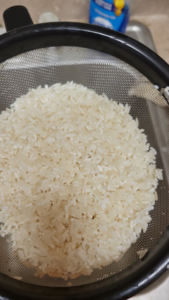
Introduction
A common question in the kitchen is whether rice should be rinsed before cooking. This seemingly simple step can impact the texture and quality of your final dish. Here’s a closer look at why rinsing rice is often recommended and how it affects your cooking.
The Benefits of Rinsing Rice
Rinsing rice before cooking is a widely practiced technique with several benefits:
- Removes Excess Starch: One of the main reasons for rinsing rice is to remove excess starch. Rice grains are coated with starch, which can lead to a gummy or sticky texture when cooked. Rinsing the rice helps to wash away this extra starch, resulting in fluffier and separate grains.
- Cleans the Rice: Rinsing also helps to remove any impurities or dust that may be present on the rice. This is particularly important for rice that has been processed or stored for a long time. By rinsing, you ensure that your rice is cleaner and more pleasant to eat.
- Improves Texture: For certain types of rice, especially varieties like jasmine or basmati, rinsing is crucial to achieving the desired texture. These types of rice benefit from being less sticky, and rinsing helps achieve that by reducing the starch content.
The Case Against Rinsing
Despite its benefits, there are some arguments against rinsing rice:
- Loss of Nutrients: Some argue that rinsing rice can wash away important nutrients, especially if the rice is enriched. While the loss of nutrients is typically minimal, it’s worth considering if you rely on rice as a significant part of your diet.
- Convenience: In fast-paced cooking environments, rinsing rice adds an extra step. For those seeking convenience, skipping the rinsing process might seem more practical, particularly when using quick-cooking rice.
When to Rinse and When to Skip
Whether you should rinse rice depends on the type of rice and the desired outcome:
- White Rice: Rinsing is generally recommended for white rice to remove excess starch and improve texture.
- Brown Rice: Brown rice has a tougher outer layer and doesn’t require rinsing to the same extent. However, rinsing can still help remove dust and debris.
- Specialty Rice: For varieties like jasmine or basmati, rinsing is particularly beneficial to achieve the light and fluffy texture characteristic of these types.
- Convenience or Health: If you’re using pre-cooked or instant rice, rinsing may not be necessary. Similarly, if you’re concerned about nutrient loss, check the packaging or choose non-enriched rice.
Conclusion
In conclusion, rinsing rice before cooking can enhance texture, remove excess starch, and ensure cleanliness. While it may not be necessary for all types of rice, it is generally beneficial, especially for varieties where texture is key. Ultimately, the decision to rinse rice should be based on your preferences, the type of rice, and your cooking goals.